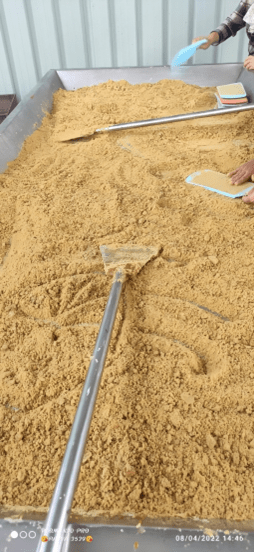A process has been developed for a non-chemical production of highly crystalline powder jaggery. This process involves exposing viscous jaggery syrup to the ambient atmosphere until it reaches a semi-solid state. The semi-solid mass is then subjected to processes such as stirring, spreading, and scraping, which can be done manually or with the help of apparatus. As a result, free-flowing jaggery is produced in the powdered form.
The steps of crushing and sun-drying increase the probability of physical (dirt) and microbial contamination, which are serious issues and hamper the shelf life of jaggery. Baking soda is also utilized in making jaggery, which increases its sodium content to unwanted levels. Therefore, the existing process for the production of powder jaggery involves the use of chemicals and is unhygienic, and many times results in deterioration of the product during storage itself.
- The developed process does not require any chemical treatment.
- Jaggery is produced from the syrup directly without crushing solid blocks and avoiding centrifugal action, which removes most of the nutritional component of the jaggery.
- It produces powdered jaggery only by mechanical attrition with no additives.
- It results in very fine free-flowing powder jaggery, with typical moisture content of 1%-2%.
- It increases the mass transfer rate and promotes crystallization.
- Exposure to the more open surface simultaneously removes the excess moisture from the mass contributing to a good quality and longer shelf-life of jaggery.
- Production of powder in a hot condition results in extra crystalline jaggery.
- The risk of physical (dirt) and microbial contamination is minimized by the rapid preparation process.
- It retains the nutritional component of the jaggery.
- Mechanized by using machinery for stirring action, it eliminates manual intervention and ensures consistent, high-quality, and hygienic powder jaggery with higher shelf-life.
A prototype of a crystalliser, as shown in the drawings, has been proposed. In this crystallizer, the blades (screws) move in opposite directions, creating the necessary shear between their surfaces. The blades are not fully circular; each has a cut and a guide (fin) with a slight inclination to facilitate the forward motion of the jaggery. The gap between the blades is adjusted to reduce the particle size of the jaggery as it moves forward.
This crystallizer can process approximately 50-80 grams of jaggery per minute. It measures 270 mm in length, with a blade diameter of 60 mm, and the gap between the blades gradually reduces from 20 mm to 6 mm. The powder jaggery produced in this crystallizer has higher crystallinity compared to traditional solid blocks, as evidenced by lab results (DSC).
The invention is at the stage of pilot or full scale system demonstration in an operational environment.
7
The use of a chemical-free and hygienic production process will further increase demand of the produced jaggery, as consumers are increasingly seeking healthier and safer food options.
The market for unrefined and organic food products is growing rapidly, with many people switching from sugar to jaggery due to its nutraceutical properties. Powder jaggery offers a suitable alternative to white sugar, as it eliminates the need to cut and mix solid jaggery blocks. This ease of use is driving many producers to enter the powder jaggery market. Additionally, the use of a chemical-free and hygienic production process will further increase demand, as consumers are increasingly seeking healthier and safer food options.
Numerous FMCG companies are both selling jaggery and using it to create other valuable products. These companies represent potential targets for the proposed process. With a clear understanding of the underlying science, this process can be easily scaled up to meet large-scale market demand.
Geography of IP
Type of IP
201921017279
525046

